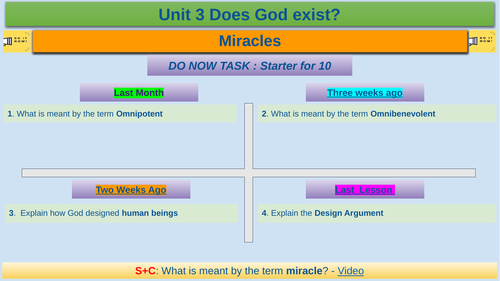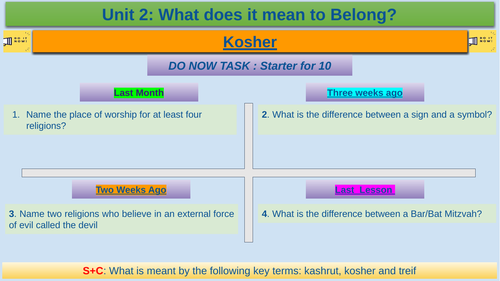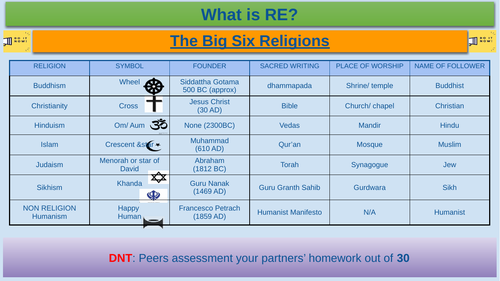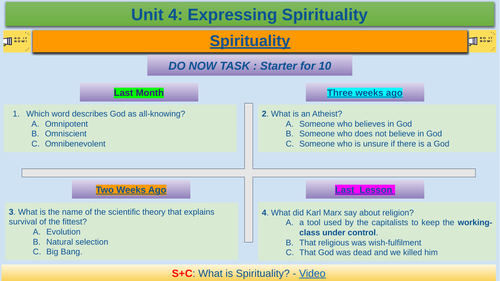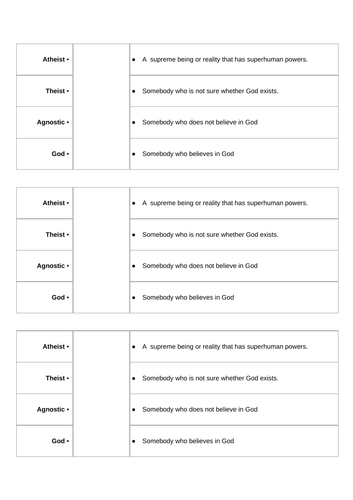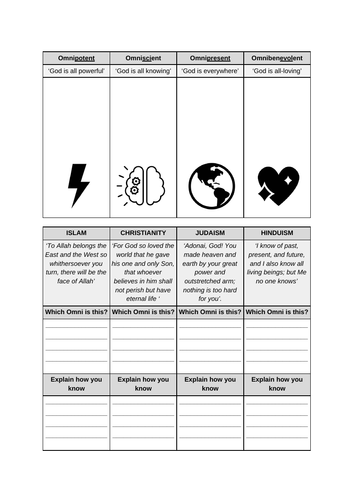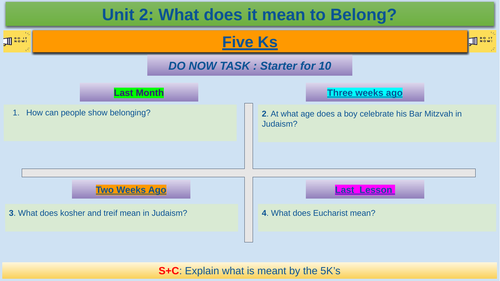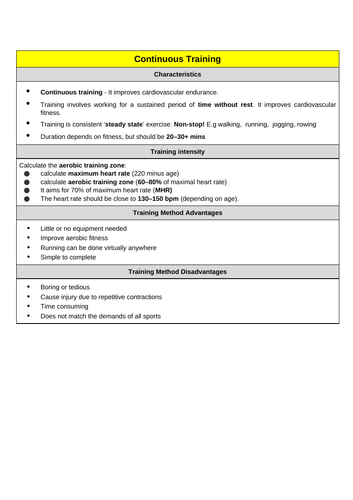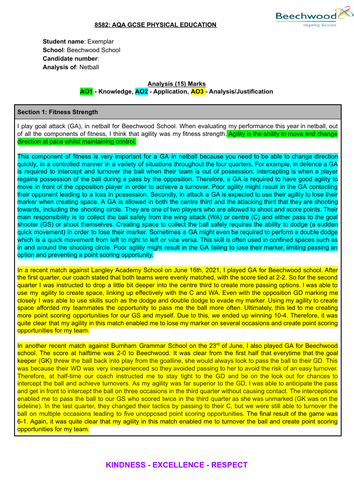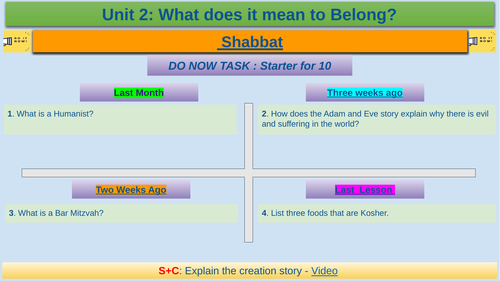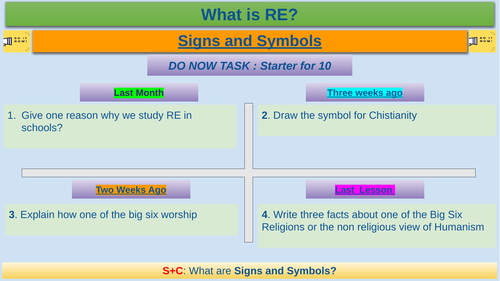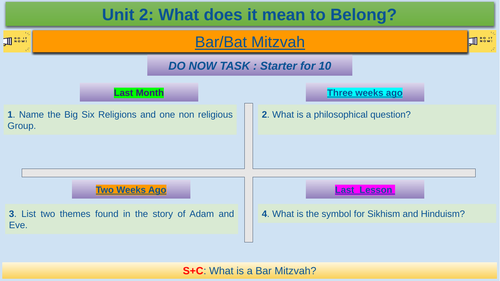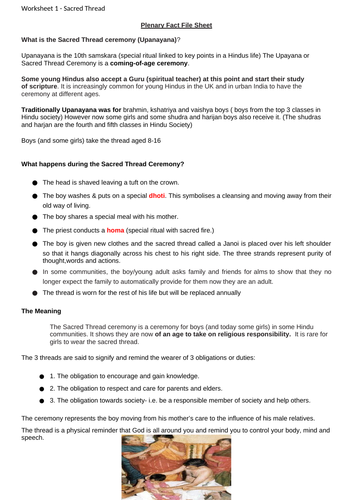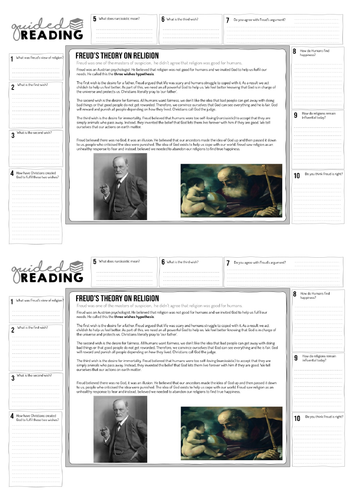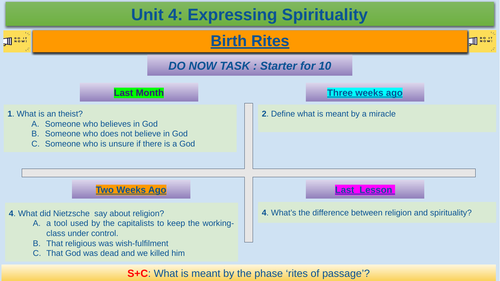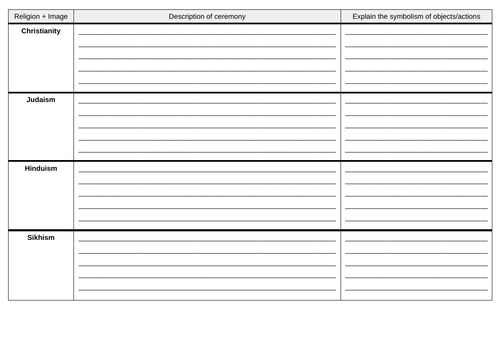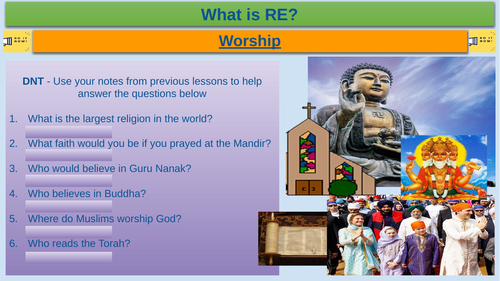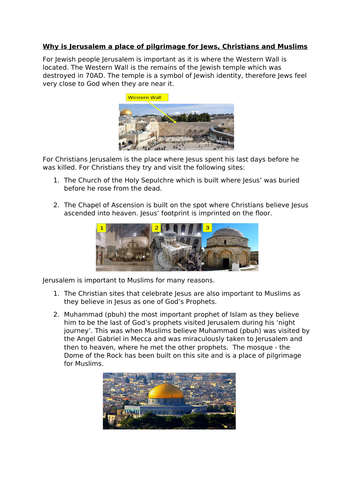
221Uploads
34k+Views
7k+Downloads
All resources

Drugs in Sport
Chapter 13 - Sport and society and the role of technology in physical activity and sport
Resource includes PowerPoint presention and differentiated worksheets for a 1 hour lesson, following the AQA specification.
Students will be able to:
AO1: To identify the the types of drugs used by performers
AO2: To explain the social, physiological and psychological reasons athletes may take drugs to specific sports
AO3: To evaluate the implications of drug use and the effectiveness of strategies used for eliminating the use of performance enhancing drugs in sport.
Feedback is welcome, please check out the rest of my lessons.

Miracles
KS3 Philosophy and Ethics - Unit 3 Does God exist?
Students will be able to:
To describe the different understanding of the word miracle
To explain the arguments for and against miracles
To evaluate whether miracles prove the existence of God
Feedback is welcome, please check out the rest of my lessons in the Science and Religion Scheme of Work!

Kosher
KS3 Philosophy and Ethics - Unit 1 - What is RE? SoW.
Students will be able to:
To identify the meaning of the key words: kashrut, kosher and treif.
To examine what foods orthodox (strict ) Jews can eat and what foods they cannot.
To analyse why religious Jews follow the Jewish food laws
Feedback is welcome, please check out the rest of my lessons in the Science and Religion Scheme of Work!

The Big Six Religions
KS3 Philosophy and Ethics - Unit 1 - What is RE? SoW.
Students will be able to:
To describe key knowledge on the big six religions
To examine the key artifacts of the big six religions
To explore the origins of the big six religions
Feedback is welcome, please check out the rest of my lessons in the Science and Religion Scheme of Work!

Spirituality
KS3 Philosophy and Ethics - Unit 4 Expressing Spirituality: What makes a journey special?
Students will be able to:
To describe what is meant by spirituality
To explain how people may show spirituality
To consider the difference between being spiritual and being religious.
Feedback is welcome, please check out the rest of my lessons in the Science and Religion Scheme of Work!

Does God exist?
KS3 Philosophy and Ethics - Unit 3 Does God exist?
Students will be able to:
To identify the words, Theist, Agnostic, Atheist
To explain why people may hold Theist, Agnostic or Atheistic beliefs
To explore how these beliefs may affect people’s view on the purpose of life
Feedback is welcome, please check out the rest of my lessons in the Science and Religion Scheme of Work!

Nature of God
KS3 Philosophy and Ethics - Unit 3 Does God exist?
Students will be able to:
To describe the following keywords; omnipotent, omniscient, omnipresent
To explain and justify the nature of God
To evaluate the nature of God
Feedback is welcome, please check out the rest of my lessons in the Science and Religion Scheme of Work!

Five Ks
KS3 Philosophy and Ethics - Unit 2: What does it mean to Belong?
Students will be able to:
To identify the 5K’s of Sikhism
To explain the significance of the 5K’s to a Sikh
To evaluate whether people should be able to express religious identity and belonging
Feedback is welcome, please check out the rest of my lessons in the Science and Religion Scheme of Work!

GCSE PE NEA Coursework Guide - Evaluation (Suitable Training Type)
This resource includes;
A complete, top scoring, exemplar for section 5 (Suitable Training Type) the AQA GCSE PE coursework task.
A step by step guide, containing sentence starters and checklists to help students structure and keep track of the tasks they have completed.
This exemplar uses the sport of netball and is written by a teacher to showcase a top grade and meet all of the assessment objectives given in the specification marking grid.

AQA GCSE PE NEA Coursework Guide - Analysis Section 1 (Fitness Strength)
This resource includes;
A complete, top scoring, exemplar for section 1 (Fitness Strength) the AQA GCSE PE coursework task.
A step by step guide, containing sentence starters and checklists to help students structure and keep track of the tasks they have completed.
This exemplar uses the sport of netball and is written by a teacher to showcase a top grade and meet all of the assessment objectives given in the specification marking grid.

Shabbat
KS3 Philosophy and Ethics - Lesson 1 of Unit 1 - What is RE? SoW.
Students will be able to:
To identify what is meant by Shabbat
To explain why and how Jews celebrate Shabbat
To evaluate whether Shabbat is still important for Jews in Britain today
Feedback is welcome, please check out the rest of my lessons in the Science and Religion Scheme of Work!

Signs and Symbols
KS3 Philosophy and Ethics - Unit 1 - What is RE? SoW.
Students will be able to:
To identify what is meant by a sign and symbol
To explain the difference between a sign and a symbol
To examine the meaning of at least one religious and secular symbol
Feedback is welcome, please check out the rest of my lessons in the Science and Religion Scheme of Work!

Bar_Bat Mitzvah
KS3 Philosophy and Ethics - Unit 2: What does it mean to Belong?
Students will be able to:
To identify when a child becomes an adult in the Jewish community
To examine the key features of a Bar/Bat Mitzvah
To analyse the impact of a Bar/Bat Mitzvah on the Jewish community
Feedback is welcome, please check out the rest of my lessons in the Science and Religion Scheme of Work!

Sacred Thread Ceremony
KS3 Philosophy and Ethics - Unit 2: What does it mean to Belong?
Students will be able to:
To identify what happens during the sacred thread ceremony
To explain the responsibilities a Hindu boy takes on after the sacred thread ceremony
To analyse the benefits of the sacred thread ceremony for all Hindus
Feedback is welcome, please check out the rest of my lessons in the Science and Religion Scheme of Work!

Psychologists viewpoint on God
KS3 Philosophy and Ethics - Unit 3 Does God exist?
Students will be able to:
To explore the background of three mainstream psychologists
To explain how some Psychologists view God
To evaluate the psychologists viewpoint on God
Feedback is welcome, please check out the rest of my lessons in the Science and Religion Scheme of Work!

Birth Rites
KS3 Philosophy and Ethics - Unit 4 Expressing Spirituality: What makes a journey special?
Students will be able to:
To describe what happens at a birth rites
To explain why birth rites are important
To analyse how birth rites provide a sense of belonging
Feedback is welcome, please check out the rest of my lessons in the Science and Religion Scheme of Work!

Coming of Age Ceremony
KS3 Philosophy and Ethics - Unit 4 Expressing Spirituality: What makes a journey special?
Students will be able to:
To describe what happens at a Coming of Age Ceremony
To explain why these ceremonies are important
To analyse how Coming of Age Ceremonies provide a sense of belonging
Feedback is welcome, please check out the rest of my lessons in the Science and Religion Scheme of Work!

Worship
KS3 Philosophy and Ethics - Unit 1 - What is RE? SoW.
Students will be able to:
To describe what is meant by worship
To identify where and how religious people worship
To examine interesting facts about each of the big six religions
Feedback is welcome, please check out the rest of my lessons in the Science and Religion Scheme of Work!

Pilgrimage
KS3 Philosophy and Ethics - Unit 4 Expressing Spirituality: What makes a journey special?
Students will be able to:
To describe what is meant by the term pilgrimage
To explain why Jerusalem is an important place of pilgrimage for to all three Abrahamic religions.
To analyse how a pilgrimage provides a sense of belonging
Feedback is welcome, please check out the rest of my lessons in the Science and Religion Scheme of Work!

Consequences and Victims of War - AQA - Religious Studies GCSE
Resource includes PowerPoint presention and differentiated worksheets for a 1 hour lesson, following the AQA specification.
Component 2: Thematic studies
Theme D
L1 - Forgiveness and Reconciliation
L2 - Pacifism and Peacekeeping
L3 - Violent Protests
L4 - Terrorism
L5- Consequences and Victims of War
L6 - Weapons of Mass Destruction and Nuclear Weapons
L7 - Holy War and Just War
L8 - Assessment
L9 - DiRT


